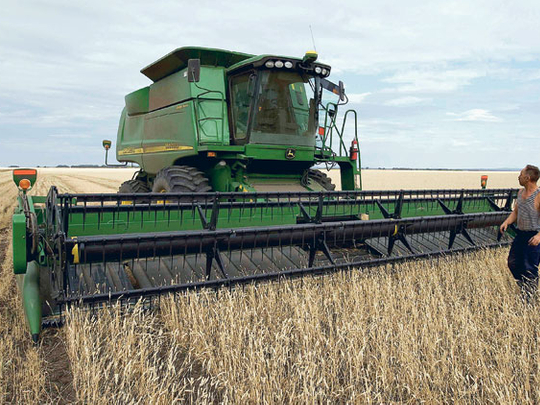
London: European wheat prices hit more than 192 a tonne, 60 per cent higher than a year ago. Two years after the last food crisis, when prices surged by nearly 15 per cent in the UK, food inflation is back.
Soaring global food prices have prompted City and food industry experts to warn that the cost of the weekly shop is set to rise by up to 10 per cent in the coming months.
As in 2008, rocketing prices are the result of rising demand and supply shortages caused by freak weather and poor harvests. Moreover, these conditions are exacerbated by speculation on commodity markets and changing diets in fast-growing Asian countries.
Last week, the UN's Food and Agriculture Organisation (FAO) called an emergency meeting for September 24 to discuss the food crisis.
In Mozambique, riots broke out following the government's decision to raise bread prices by 30 per cent, leaving seven people dead and hundreds injured. At the same time Russia extended its export ban on wheat by another 12 months as it battles drought, shortages and inflation at home, which threatens to push prices further.
European wheat prices hit more than 231 (192) a tonne last week, just below last month's two-year high of 236 but still 60per cent higher than a year ago in sterling terms. Corn prices are at their highest level since June 2009 while sugar has been on a rollercoaster ride after hitting a 29-year peak in February.
FAO economist Abdul Reza Abbassian raises the prospect of further civil unrest in less developed countries if the price of basic food continues to rise: "Russia's move is another unfortunate development that will prolong upward pressure on grain prices and contribute to higher price instability in world markets. Rioting may reappear in poor districts around the world if prices of basic foodstuff commodities continue to rise further. "
Surging wheat prices, along with higher sugar and oil-seed costs, drove the FAO's international food price index up 5 per cent last month, the biggest rise since last November.
The organisation estimates this year's wheat crop at 646 million tonnes down 5 per cent from last year while world barley production, also hit by bad weather in the former Soviet Union and the EU, is forecast to drop by 22 per cent to a 30-year low of 129m tonnes. Last month global meat prices hit a 20-year high.
In the UK, Premier Foods, owner of the Hovis brand, has warned the global shortage of wheat could push up the cost of bread, while other food brands such as McDougalls flour and Kipling cakes will also cost more. A leading UK supplier of flour, Rank Hovis, is to increase its prices from September 6.
Absorbing increases
Experts fear that UK food price inflation, which was running at an annual rate of 3.4 per cent in July, could now rise to 10 per cent depending on whether costs continue to climb and to what extent food manufacturers absorb the increases.
The Grocer's food and drink editor Alex Beckett reckons that if prices for commodities remain at current levels, by January the weekly shop could cost 10 per cent more than 12 months previously.












